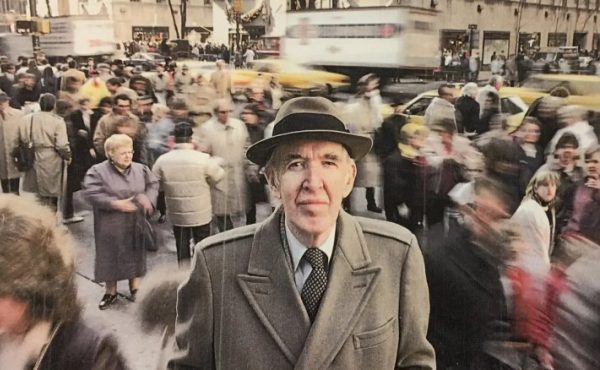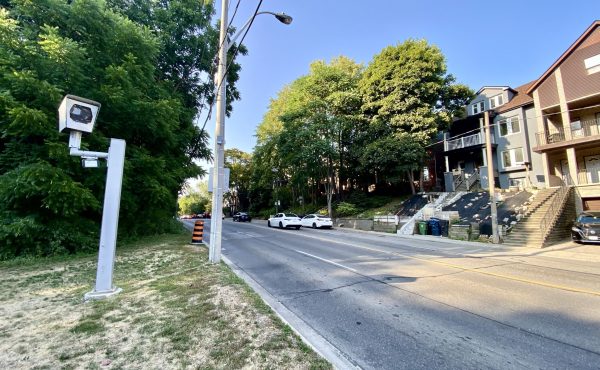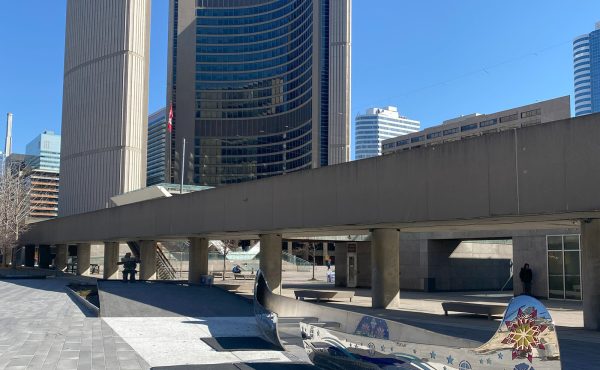Road tolls are one of the oldest and most common forms of paying for transportation infrastructure — they go back millenia, and although they are not common in Canada they are common in the United States and Europe on expressways, bridges and tunnels.
If Metrolinx were to use them to pay for transit funding, it would take the form of adding tolls to the 400-series highways across the GTHA and their city-owned extensions, the Don Valley Parkway, the Gardiner Expressway, and presumably Allen Road.
(Note that tolls are distinct from a congestion charge, which is charged on all vehicles using any road in a certain area of the city. The complication for the GTHA is that congestion is just as bad across the entire City of Toronto as it is downtown. I’ll look at congestion charges briefly in a later post).
Amount charged
The CivicAction report (PDF) estimates that a 10 cents/km toll on GTHA highways would raise $1 billion a year. Tolls could also vary by time of day.
This rate would be significantly lower than the tolls on the private 407 highway.
Another possibility would be a fixed-cost charge to access these highways. That would discourage short-distance uses, focusing use on longer-distance trips. A fixed cost could be, for example, tied to the average cost of a single transit fare in the GTHA.
Cost to implement
Rating: poor
Adding a toll system to an existing highway system would require significant initial costs to set up, and also ongoing costs for maintenance and enforcement.
Depending on the technology used, it might also impose additional initial costs on drivers to purchase a transponder.
Behaviour incentives
Rating: mixed
The logic of tolling expressways is that they are a valuable good currently offered for free, which means they are massively over-used and therefore so congested that they often do not fulfill their purpose of providing rapid vehicle travel routes through the GTA.
Adding a toll would, in theory, encourage drivers who could alternatively use transit to make that choice instead, reducing congestion.
Varying the toll by time of day might also encourage drivers who have some flexibility to use the highways at less congested times, which would even out the use of this infrastructure. In this case the behaviour change would be targeted to address “hot spots” of congestion.
The problem is that, currently, many of the transit alternatives to expressways (GO trains, the Yonge subway line) are already used at full capacity during peak times. So the potential for positive behaviour change is limited until transit capacity is increased.
Another argument against tolls is that they will push traffic onto local roads. However, for that to be the case, there has to be a reasonably fast local road alternative. Lake Shore provides such an alternative for part of the Gardiner, but it does not have a lot of impact on residential areas where they run parallel. It is also already quite congested. Bayview provides such an alternative for the DVP, and would likely become more congested. The alternatives to the 401 are already very congested during rush hour. In each case, a driver would pay a significant time penalty. (This problem would likely be worse with a fixed-rate toll that encouraged shorter trips to use local roads).
A final behaviour concern that is often expressed is that people will be discouraged from coming into the centre of the city if they have to pay tolls on the main access routes. Putting tolls on highways across the GTHA may mitigate this concern somewhat. Consider, as well, that the majority of people who go to the centre of the city for work or pleasure take transit (TTC or GO), and to do so they already have to pay a fee. Drivers are currently the outlier in getting a free ride into the downtown. It is true that they have to pay parking (except where their employer provides it or they take the time to find a side street), but storing their vehicle is a different issue and reflects a separate set of costs from road use.
Political viability
Rating: poor
For reasons both rational and emotional, the idea of tolling highways in the GTHA provokes very strong resistance.
Part of the cause may be that the costs are immediately visible rather than being buried in existing costs. The fact that Canadians are not all that familiar with tolls may also play a role, as well as the fact that they will be imposed on a service that was formerly free (tolls on new infrastructure get less resistance).
Compared to the alternatives, tolls also constitute a larger cost imposition on a smaller number of people (those who use highways daily), which creates stronger and more focused resistance.
Resistance would also be likely from neighbourhoods where spillover from expressways is likely, such as along Bayview.
Tolls and congestion charges have been successful where they have clearly reduced congestion, giving the drivers who do pay a better and faster trip in exchange for the greater cost. However, it is not clear that tolling highways in the GTHA would make all that much difference to how fast they operate, since there is not a lot of capacity for people to switch to transit on these routes. Time-based charges might smooth out highway usage slightly, but possibly not enough to make a visible difference.
Given these conditions, tolling GTHA highways might be more politically viable after significant transit alternatives that specifically parallel highways have been built.
What do our readers think of this option? What are other issues, positive or negative, with highway tolls?
Tune in on Monday for the Regional Gas Tax.





12 comments
Good analysis
I can see a toll on the DVP and Gardiner making sense since there already existing public transit options to get downtown. But tolling the 401 for example would be a nightmare. The city’s streets are already extremely congested, they really can’t handle more traffic. Unless the toll price was small enough that it would not impact people’s behaviour.
You’re missing one big behavior change that tolls can effect:
While more sticky than transportation mode, neither people’s place of residence nor their place of work is fixed. People move or change jobs all the time.
By adding a financial cost to the existing time cost of commuting, you encourage people to seek jobs closer to their homes, or to buy/rent closer to their workplace than they otherwise might. e.g. A 10 cent / km charge would be $140 more out of pocket each month–why not pay that in rent and spend less time sitting in traffic too.
That sort of change reduces traffic congestion, without increasing strain on transit.
Can’t wait for the gas tax article… I really don’t see why that isn’t pushed a LOT more than road tolls… it would be relatively painless to implement and there wouldn’t be all that infrastructure required to charge and bill etc.
The provincial government really should have come out strong on raising the provincial portion of our sales tax when the feds chopped 2 cents off the GST aka $12 BILLION dollars per year. Feels like everything costs exactly what it did before… $12 billion n per year seems to be rather steep for such little benefit.
What about tolling the 401 express lanes? Keep the collectors free and give people the option to pay to take the express
As reasoned as you are I have to disagree with most of your points. I spend a lot of time in the US and have a lot of toll receipts to prove it. A few points.
-A 10 cent toll is waaaaaaay too low. In Chicago they range from 50 cents up to $1.60. Think about how much cash could be raised?
-Tolls are not about reducing congestion in the real world, they are about raising money for other projects. Drive anywhere there are road tolls and then try to tell me it is not congested. (you cant use the 407 as an example as it is an anomaly with free routes nearby.)
-if 10 cents a toll raises a billion dollars then the cost of installing them would be paid for in a year. Easy as pie.
-My experience is that people do not drive around tolls, they just pay. If you have an extra hour and a half to take local roads downtown then great, most people dont.
-In terms of politics how do you think politicians do it in the land of the free? The public realizes that there has to be new revenue sources to keep Toronto going and you either raise taxes or find other sources. I think that the public has moved towards liking tolls despite the rantings of a few loud car zealots on council. By the way I have a bike, I ttc, I have a car and I support road tolls.
–and lastly, although most Toronto navel gazers will not agree, Toronto’s congestion is actually pretty good compared to most cities its size.
The proposed toll isn’t 10 cents to get on the highway, it’s 10 cents for every kilometer driven.
I own a very modest car by today’s standards. It’s HVAC system keeps me very comfortable during any weather Toronto has yet to throw at me. The seats are very comfortable and the car is easy to drive. A “luxury” sound system came standard and kicks ass. Using an after-market device, I can listen to the music or podcasts on my iPod or iPhone. There are enough cup holders to look after a football squad. If desired, I can connect to the world via my old iPhone 3GS – which also has a pretty good GPS mapping function … jeez I can even watch a couple of TED episodes while sitting stopped on the 401 … if I don’t mind risking a $168 ticket.
I am so freaking comfortable that you’d have to pry me out of my car with a crowbar. This from a person who rides to work at least a couple times a week during nice weather, is a HUGE supporter of public transit and has been screaming about people living closer to their work for 30 years.
I pulled in to get gas the other day at the corner of Greenwood and Danforth. A highly refined liter of precious “regular” gasoline cost me $1.28. At that same gas station I purchased a liter of bottled water and it cost $1.79 plus tax. With gasoline, having been extracted – presumably – from either the oil rich tar sands of western Canada or the oil fields of Saudi Arabia and transported thousands if not tens of thousands of kilometers to my neighbourhood some how costing less than a bottle of water, why would ANYONE get out of their car. GAS IS CHEAPER THAN WATER! What’s the incentive to change my behaviour?
The alternative at present is a dirty, slow, packed uncomfortable (SRO during rush hours which seem to go from 7-10am then 3-7pm)) trip on a too cold or hot streetcar/subway. Along the way I get to rub shoulders with people who have been sneezing, coughing and hacking all the way from Main Station and the the moron with the ear buds turned up so loud that I can hear his music from 30 feet away. I have to wait in the cold for a streetcar that is rarely on schedule, short turns on a whim and under the best circumstances still deposits me three blocks away from my destination at one end and 6 blocks away at the other. I’m being too kind.
If there’s an accident on the road, I sit and sit and sit. The streetcar can’t move and a bus to relieve the waiting passengers has NEVER been sent. Sure, I might be able to grab a cab, but that isn’t a real alternative for everyone is it? Streetcars, sharing lanes with general traffic, have long outlived their usefulness. Dump them for buses or put them on independent right of ways.
Nope. the alternatives are so poor in and around Toronto that you can feel free to charge taxes, tolls, congestion fees, user fees or whatever you want to call them and so few people will change their driving habits that it just won’t make a difference – except that of course you’ll have more money to add to general revenue that can be spent on Mayor McDumbass’s football teams, trips to Chicago … Ooops. sorry that’s a rant for another time.
Ed Horner
Ed,
I am glad that you as a driver would happily pay up extra toll or tax and keep driving. You know, we really could use your money. As bad as TTC sounds from your perspective, the very fact that it is so crowded, tells me that demand for it is high and outstrips supply. So if we use the money raised from you to build more transit, I am pretty sure more people will use it. So thank you very much and we have a deal. Incidentally, since more people will be using the transit, you may find your ride a bit faster too. Maybe you will be able to only watch one episode of TED, instead a couple of them. Enjoy.
I would like to see the Express Lanes of major highways around Toronto turned into toll routes, and ideally, into a fully-interconnected network of Express-Toll Route” lanes that would include the 407.
But these lanes would also be free for registered carpoolers and for GO and municipal buses. This would reduce some of the pressure on the “Collector” lanes, and provide an incentive to people to carpool & use public transit. Ideally some of the toll money could pay for an expansion of GO bus service in the GTA.
The key feature would have to be that one would be able to drive along any of these “ETR” lanes and experience a faster, more reliable trip.
Right now one can drive from the “Express Lanes” of the 404 onto the 401 and continue all the way to the 403 at Eglinton Ave.
There are also “Express” lanes on the 427 (Eglinton to the QEW) and the QEW (Kipling to Park Lawn).
Connecting these lanes, and making drivers pay only when they enter the Express Lanes, would actually reduce the number of gantries required. One can compare the number of gantries on the 407 at each interchange, with the number of Collector-Express transfers on the 401, 403, QEW and 427 to get an idea of the savings.
I would prefer to see this initiative because it would not cost as much money as tolling the whole highway, would encourage drivers to carpool or shift to public transit, or alternatively shift their trips or travel less, and it would bring additional revenue to Metrolinx (by tolling more highways) without a massive increase in congestion (that tolling the 401, DVP & Gardiner alone would bring.
I’d love to see the Cities Centre and Civic Action groups explore this topic.
Cheers, Moaz
The Gardener is going to collapse any day now unless we rebuild it properly, so the options there as I see them are a.) put road tolls on the Gardener, or b.) tear it down, c.) it falls down anyway.
This is a great series! Thanks Dylan!
For the longest time, we have encouraged people to live close to highways so that they do not drive on residential or more local streets. Now we are taxing those people. Most subways are not near highways (Yonge, B-D), but some one who drives on a route where subway or streetcar exist will pay nothing. Until they come up with GPS based tolls (varying charge for different zones), or congestion charges for driving in the core, I do not like road tolls.
I take some issue with the line “Drivers are currently the outlier in getting a free ride into the downtown.” This completely ignores the gas tax that already exists. Obviously not all of gas tax goes to major highways, but 38.603¢ per litre is currently taxed. Consider that a modest (by GTA standards) trip of northwest Scarborough to Yonge and Wellesely in a modern compact non-hybrid results in $2 taxation (not gas cost, taxation) per day/round trip. While that’s minor compared to the 6 dollar round trip (assuming no discount) for the TTC, it’s a disengenious to pretend drivers pay nothing to government(s) to commute in the GTA on a per-km basis. In fact, someone driving a less efficient vehicle like a midsize SUV to the Pickering-Scarborough border from downtown would be payin upwards of 4 dollars gas tax daily, which is pretty much in the wheelhouse of what having a metropass you use twice a day costs. As a (most of the time) driver and, dare I say it here, a car enthusiast, I’m not adverse to further gas taxation. If I’m going to be paying big at the pump, mass transit is about the most comforting thing said payments could go to, but DON’T sell it by proclaiming that I was getting a free ride to begin with. All this of course ignores the transportation costs a car owner occurs that transit users, pedestrians, etc. don’t. Repair costs, initial purchase, etc. shouldn’t be the concern of mass transit entities, but that doesn’t excuse ignoring them in cost analysis with regards to the owner/driver.